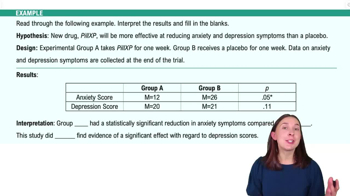Table of contents
- 1. Introduction to Psychology1h 43m
- 2. Psychology Research2h 20m
- 3. Biological Psychology2h 41m
- 4. Sensation and Perception28m
- 5. Consciousness and Sleep32m
- 6. Learning41m
- 7. Memory34m
- 8. Cognition37m
- 9. Emotion and Motivation35m
- 10. Developmental Psychology33m
- 11. Personality48m
- 12. Social Psychology41m
- 13. Stress and Health41m
- 14. Psychological Disorders44m
- 15. Treatment47m
2. Psychology Research
Evaluating Research Findings
Struggling with Psychology?
Join thousands of students who trust us to help them ace their exams!Watch the first videoMultiple Choice
Richard Ryan and Edward Deci's self-determination theory asserts that the three primary human interpersonal needs are competence, relatedness, and
A
self-esteem.
B
self-actualization.
C
safety.
D
autonomy.
 Verified step by step guidance
Verified step by step guidance1
Understand the core concept of Self-Determination Theory (SDT) by Richard Ryan and Edward Deci, which focuses on human motivation and personality.
Identify the three basic psychological needs according to SDT: competence, relatedness, and autonomy.
Clarify the meaning of each need: Competence refers to the need to feel effective and capable in one's activities; Relatedness involves the need to feel connected and belonging to others; Autonomy is the need to feel in control of one's own behaviors and goals.
Recognize that self-esteem, self-actualization, and safety are important psychological concepts but are not the primary needs identified in SDT.
Conclude that the correct answer, which completes the list of primary needs in SDT, is autonomy.

 6:00m
6:00mWatch next
Master Descriptive Statistics – Measures of Central Tendency with a bite sized video explanation from Hannah Gordils
Start learningRelated Videos
Related Practice















![Ethical Guidelines in Psychology [AP Psychology Unit 1 Topic 6] (1.6)](https://img.youtube.com/vi/ilq2nGO7_QA/mqdefault.jpg)





























